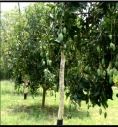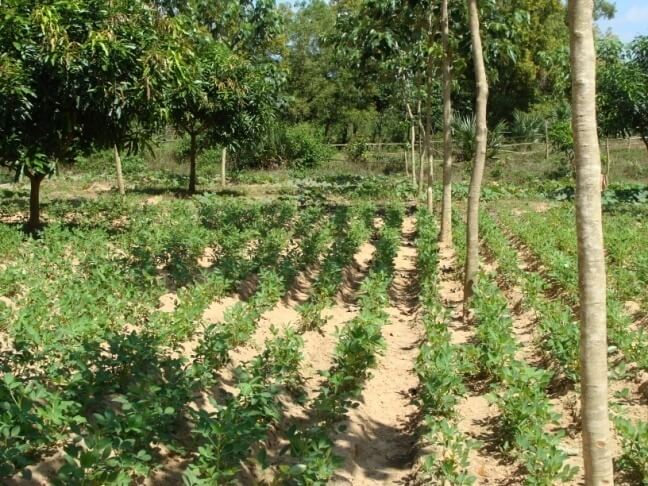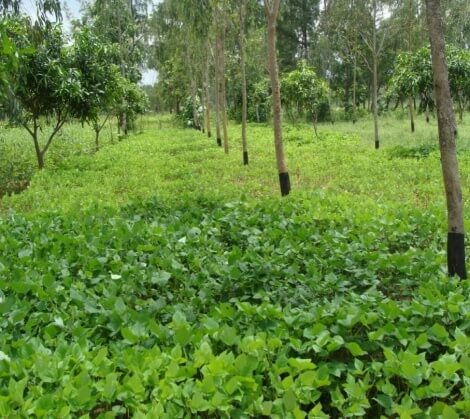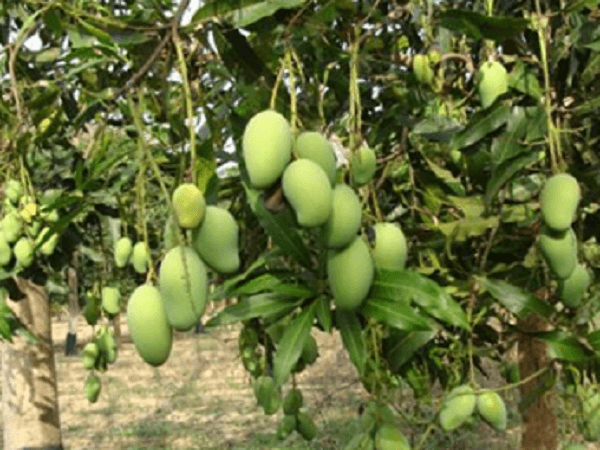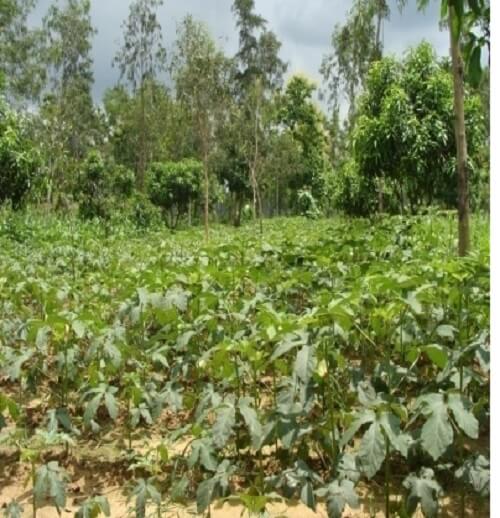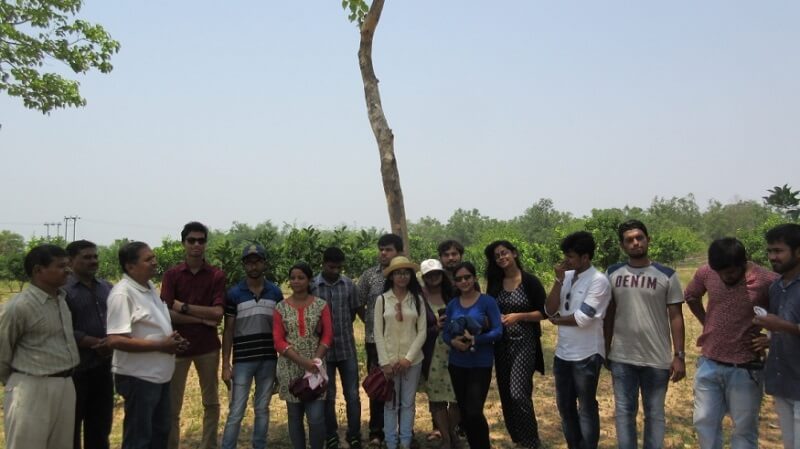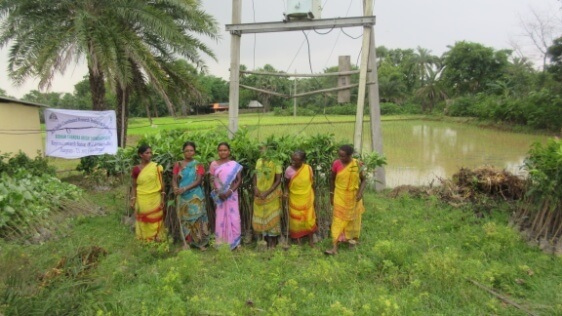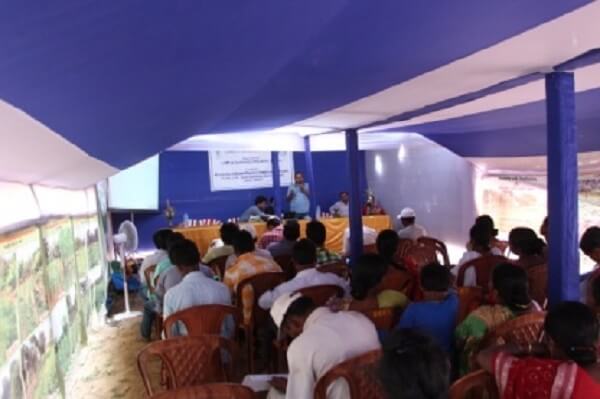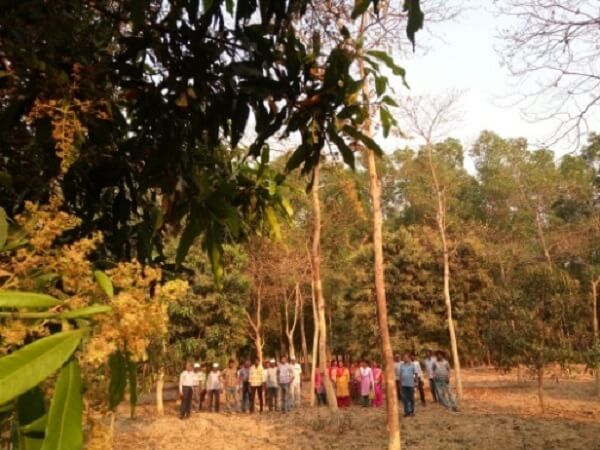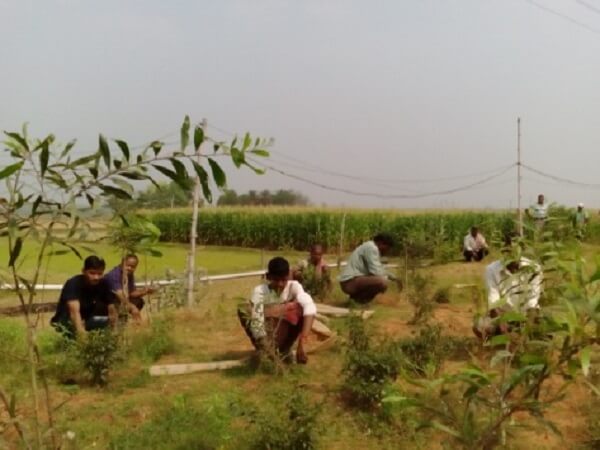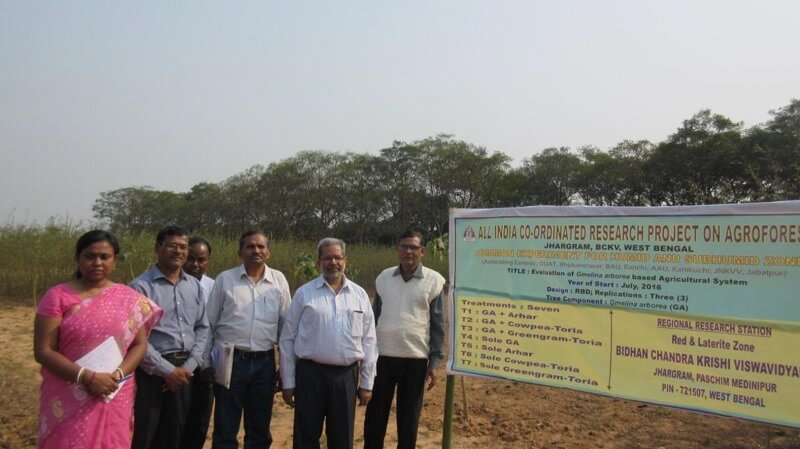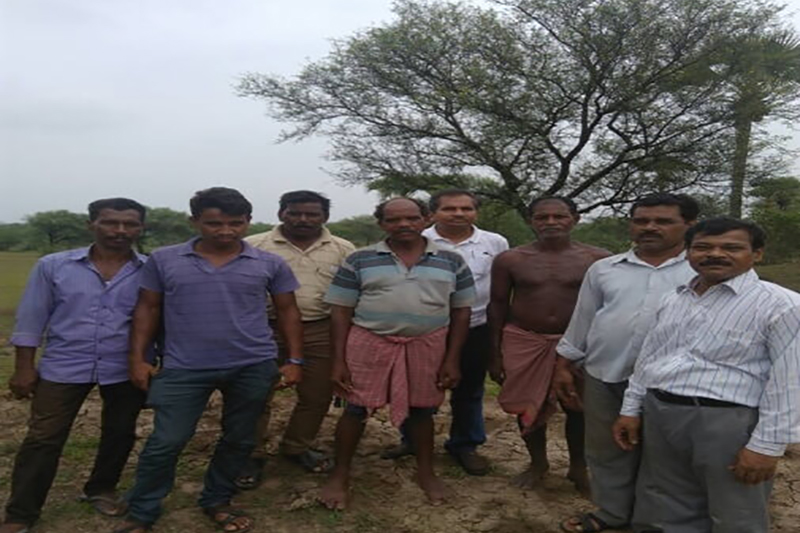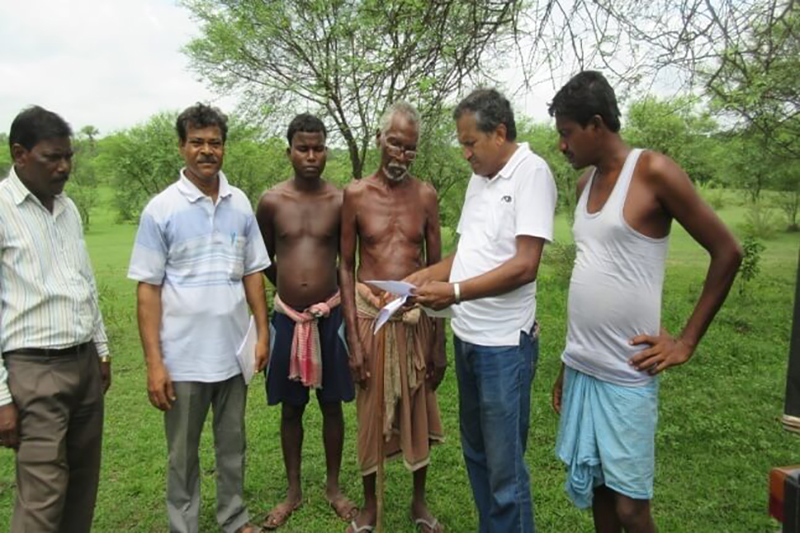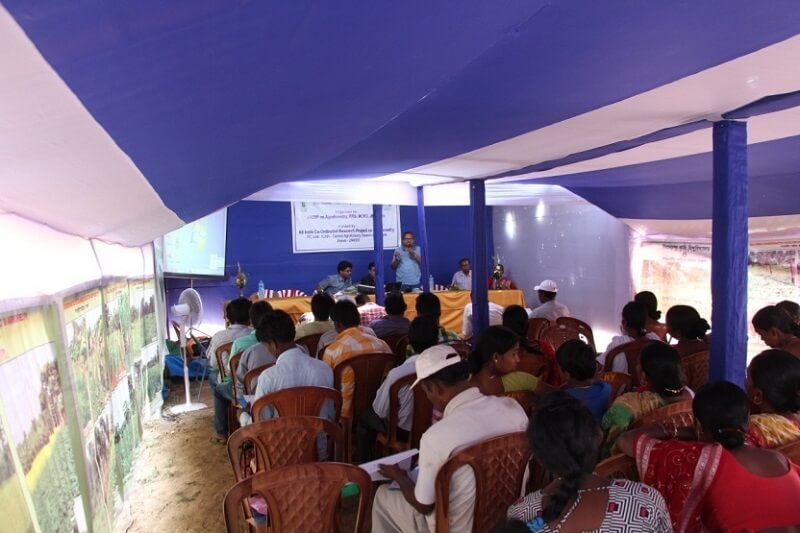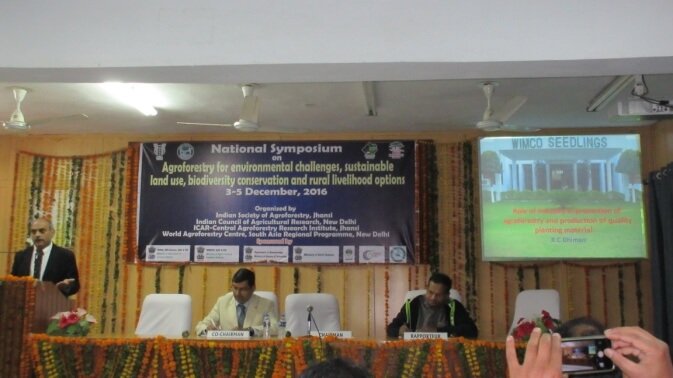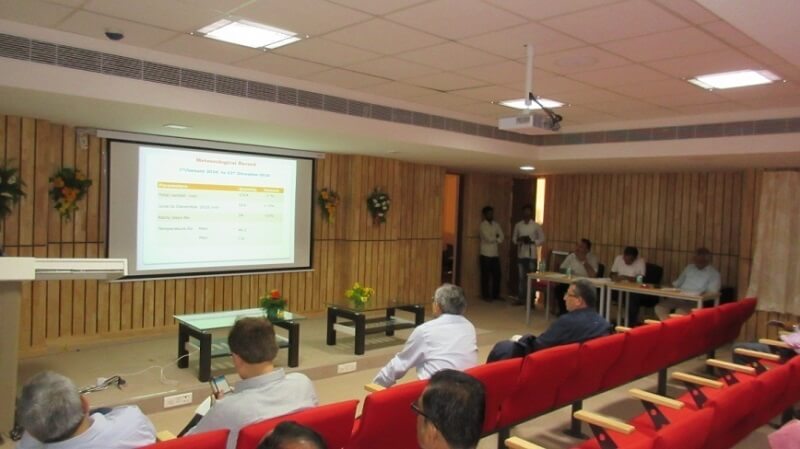AICRP on Agroforestry
On farm research activities are conducted at Regional Research Station (Red & Laterite Zone), Bidhan Chandra Krishi Viswavidyalaya, Jhargram, West Bengal, Pin-721507 (Situated at 22030’N latitude and 8700’E longitude and at an elevation of 78.77 m above mean sea level). The farm, in general, is situated on undulating tract of high rides and low valleys. Research plots are mostly situated on upland spreading on approximately 20 ha area. Soils of those plots are originally coarse textured and acidic (pH varies from 5.0 to 5.5) and poor in organic matter, total nitrogen, available phosphorus and potassium contents. So fertility status of those soils is very deficient in available plant nutrients. Furthermore, the upland soils are highly susceptible to erosion hazards. The soil is of poor rooting conditions due to shallow depth with poor structure and consistency. The land is difficult to till due to presence of gravels, stone and morum, etc. at the ploughing depth. The climate of the experimental site is humid sub-tropical with short winter and long hot summer. The crop seasons of this region are broadly classified as pre-kharif (March to May), kharif (June to October) and rabi (November to February). In this area, the summer temperature is generally very high and during winter temperature remains moderately low. The annual precipitation varies between 1100 mm and 1500 mm, about 80% of which are usually precipitate between June and September i.e. during monsoon period. Even within this short period the rainfall may be unevenly distributed. Sometimes monsoon commence early or late and retreat before time. There may be prolonged breaks in rain within the season. Partial or even total crop failures are the usual features of the rainfed agriculture in this area. Groundwater status of the farm is yet to be studied. In 2011, at Annual Workshop at Thrissur, Kerala, this centre was conferred with ‘Best Presentation Award Certificate’. Though on farm research activities are conducted at RRS, BCKV, Jhargram, considering necessity of expansion of agroforestry technologies from 2016 national coordinating centre for AICRP on AF at ICAR-CAFRI, Jhansi has grouped these project activities under Humid and Sub-Humid region in this state, thereby, for the whole state of West Bengal. Presently, project activities are also extended in farmers’ plots also and extended in other districts which are also surveyed for problems and prospects for extension of agroforestry and finding out research data from farmers’ plots.
Starting date : 1983
Staff Strength (Scientific/Technical or Supporting):
| Sl.No. | Sanctioned post | Name of incumbent | Project Joining date |
|---|---|---|---|
| Scientific Staff | |||
| 1 | Scientist | Dr.Subhabrata Panda | 11.05.2016 |
| Service Personnel | |||
| 2 | Typist/Clerk | Mr.Subhashis Bhowmick | 15.06.2011 |
| 3 | Fieldman/ Field Asstt. Gr-I | Mr.Bimal Chandra Pari | 22.07.1986 |
| 4 | Fieldman/ Field Asstt. Gr-I | Mr.Joydev Rana | 01.08.1998 |
| 5 | Beldar/ Lab.Attendant Gr-II | Mr.Dilip Kumar Singha | 01.12.1999 |
| 6 | Beldar | Samir Nayek | 01.07.2009 |
| 7 | Driver | Mr.Pradip Kumar Nayek | 01.12.1999 |
| 8 | Messenger/ Senior Peon | Mr.Sunil Kumar Pal | 01.12.1999 |
Infrastructure Available:
- Soil Testing facilities.
- Agroforestry research and demonstration plots
Mandate / Objectives:
- DESIGN AND DIAGNOSTIC SURVEY: EXTENSION AND EVALUATION OF AGROFORESTRY IN FARMERS’ PLOTS:
- To increase biomass productivity
- Tree outside of forest,
- More income and employment generation,
- Addition of more nutrition to enrich the diet.
- TREE IMPROVEMENT: To identify an improved and fast growing type of good quality timber tree. Collections of different accessions Multipurpose tree (MPT) species of Acacia auriculiformis and Gmelina arborea.
- EVALUATION OF AGRI-SILVICULTURAL SYSTEM and FRUIT-BASED AGROFORESTRY
SYSTEM OF MANAGEMENT : Growth and productivity of trees and intercrops grown under Trees (Anthocephalus cadamba, Dysoxylum binectariferum, Eucalyptus tereticornis, Acacia leptocarpa, Shorea robusta, Madhuca indica, Azadirachta indica, Pongamia pinnata, Simarouba glauca, Gmelina arborea, Acacia auriculiformis, Ceiba pentandra, Anacardium occidentale) and fruit trees (Mango, guava and Sweet Orange) based– agroforestry systems for Planning of alternative land use management system in order to increase the productive capability of land and to achieve sustainable nutritional and ecological security.
No. of Trials Allocated/Conducted During 2013-18:
Following experiments were conducted:
- Design and Diagnostic Survey.
- Tree Improvement
- Common Experiment
- Studies on Gmelina-mango based Agroforestry systems
- Studies on Gmelina-sweet orange based Agroforestry systems
- Studies on Eucalyptus-mango based Agroforestry systems
Salient Findings:
- Evaluation of 18 nos. of germplasms of Gmelina arborea for genetically superior mother and establishment of seed orchard. Out of 18 nos., 6 nos. of superior germplasms were selected on the basis of their growth parameters.
- Evaluation of 29 nos. of germplasms of Acacia auriculiformis for genetically superior mother and establishment of seed orchard. Out of 29 nos.germplasm, 8 nos. of superior quality were selected.
- Some of the promising agro-horti-silvi agroforestry models evaluated:
- - Eucalyptus tereticornis+ mango + lady’s finger followed by mustard.
- - Eucalyptus tereticornis+ mango + bottle gourd followed by mustard.
- - Gamhar + Mango + lady’s finger followed by mustard.
- - Gamhar + Mango + bottle gourd followed by mustard.
- - Khaya anthotheca + mango + paddy at kharif followed by pointed gourd.
- - Khaya anthotheca + mango + paddy (kharif) - mustard (rabi) - sesame (summer).
- - Anthocephalus cadamba+ mango + paddy (kharif) - mustard (rabbi) - sesame (summer).
- Gamhar + Sweet orange and guava, fruit-based agroforestry model has become popular.
- Bambusa-based agroforestry models are also viable and popularly accepted by farmers in Red & Laterite Zone.
- Gmelina arborea based Agri-silvicultural system was evaluated.
Some viable agroforestry technologies developed through different on-station trials have been tried in the farmers’ field also. From 2016 – 17 an initiative has been taken up to popularize the practice of agroforestry in different blocks of south Bengal.
Recommendations at State/National Levels (Variety/ Technologies/Patenting etc):
Following seven Technologies have been recommended for the State of West Bengal:
- Mango + Eucalyptus (E.tereticornis) based agri-horti-silvi system in Red and Laterite zone of West Bengal
- Mango + Gamhar (Gmelina arborea) based agri-horti-silvi system in Red and Laterite zone of West Bengal
- Mango + Dysoxylum binectariferum as boundary plantation based agri-hortisilvi system in new Alluvial zone of West Bengal
- Guava based agri-horti system in new Alluvial zone of West Bengal
- Ber based agri-horti system in new Alluvial zone of West Bengal
- Agrisilviculture system for new Alluvial zone of West Bengal
- Homestead Agroforestry in West Bengal
Special Not Covered in Above:
Mass agroforestry programme has been taken up during the year 2017-18 in farmers’ land at Vill – Ramnagar, G.P. – No.2 Belatikri, Block – Binpur-I, District – Jhargram.
Extension of agroforestry through boundary plantation on farmers’ land at Vill – Radhanagar, Block + Dist – Jhargram.
Studies on Gmelina-mango based Agroforestry systems
Studies on Eucalyptus-mango based Agroforestry systems
Students from F/Horticulture, BCKV, Mohanpur On their Experiencial Learning Tour Attending Demonstration on Gamhar-Sweet Orange based AF system at RRS, BCKV, Jhargram
Outreaching Activities: Mass Agroforestry Programme under STC (TSP)
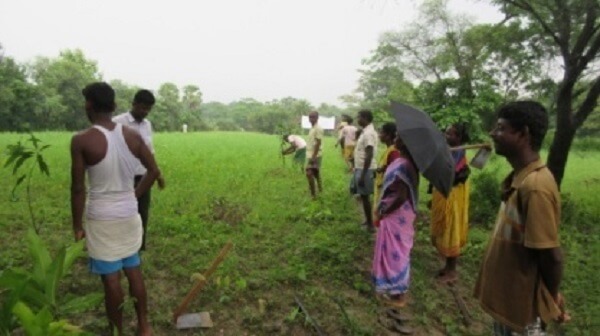
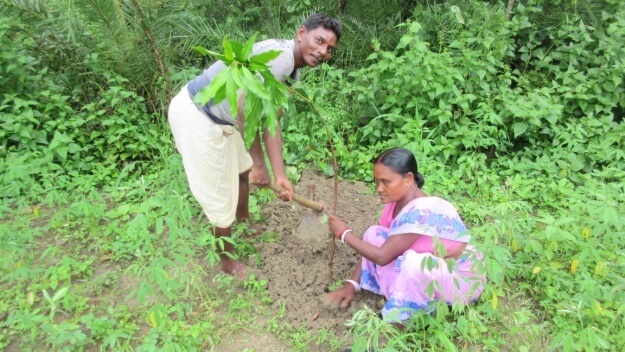

Awareness Generation on Boundary Plantation by AICRP on Agroforestry , BCKV, Jhargram in the farm of Mr. Kalipada Jana, Mauza - Radhanagar, JL No. 385, Block + Dist - Jhargram on Friday 23 rd March 2018
Common Experiment
Evaluation of Gamhar (Gmelina arborea) based Agri-silvicultural system Started in July 2016
In co-ordination with i) BCKV, Jhargram; ii) OUAT, Bhubaneswar; iii) BAU, Ranchi; iv) AAU, Kahikuchi and v) JNKVV, Jabalpur.
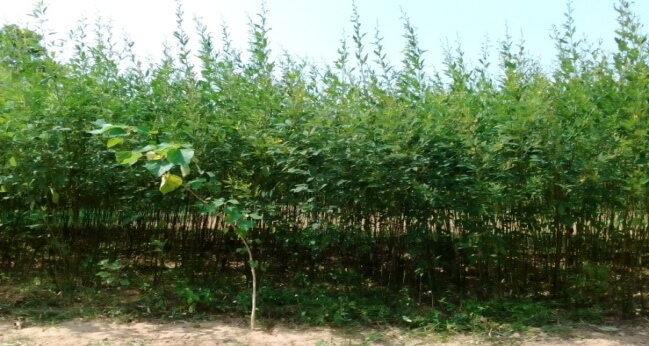 Gamhar with Pigeon pea in Common Experiment
Gamhar with Pigeon pea in Common Experiment Gamhar with Cowpea in Common Experiment
Gamhar with Cowpea in Common Experiment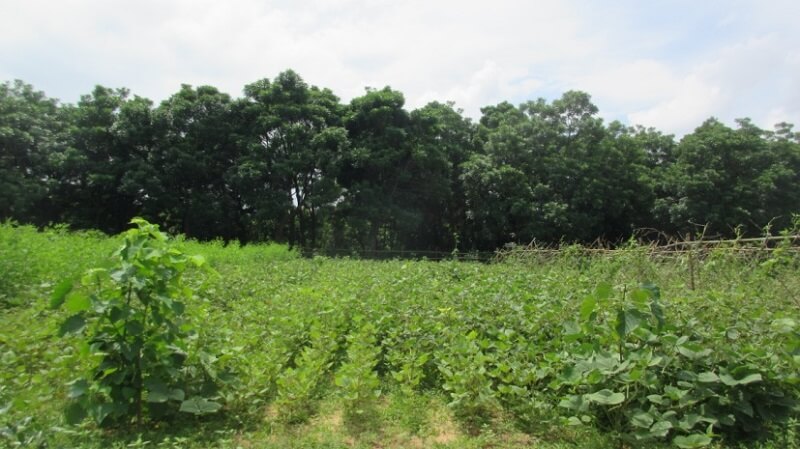 Gamhar with Greengram in Common Experiment
Gamhar with Greengram in Common Experiment Gamhar with Toria in Common Experiment
Gamhar with Toria in Common Experiment
Design and Diagnostic Survey
Field-level meetings with the tribal farmers to take-up mass agroforestry programmes under STC (TSP) of AICRP on AF in their lands under Binpur-II Block in Jhargram District during April to May 2017
Training of Farmers on Agroforestry under STC (TSP) on 9th March 2018 at AICRP on Agroforestry RRS, BCKV, Jhargram (Farmers from different Mauzas of Jhargram and Binpur-I Blocks under Jhargram District)
Achievements
Best Presentation Award Conferred on AICRPAF, Jhargram in Annual Workshop at Thrissur, Kerala in 2011


